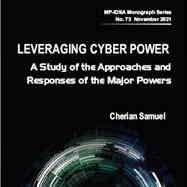Leveraging Cyber Power: A Study of the Approaches and Responses of the Major Powers
The monograph looks at how major powers have tried to pursue three objectives in cyberspace, viz. (1) strengthening or enhancing national cyber defences, and (2) striving to shape the international cyber environment by leveraging economic and technological capabilities, and (3) through defining and evangelising international cyber norms. A section on the cybersecurity preparedness of the countries of the South Asian region is incorporated to highlight those vulnerabilities and deficient capacities and capabilities that give the major powers a foothold to pursue their objectives.














